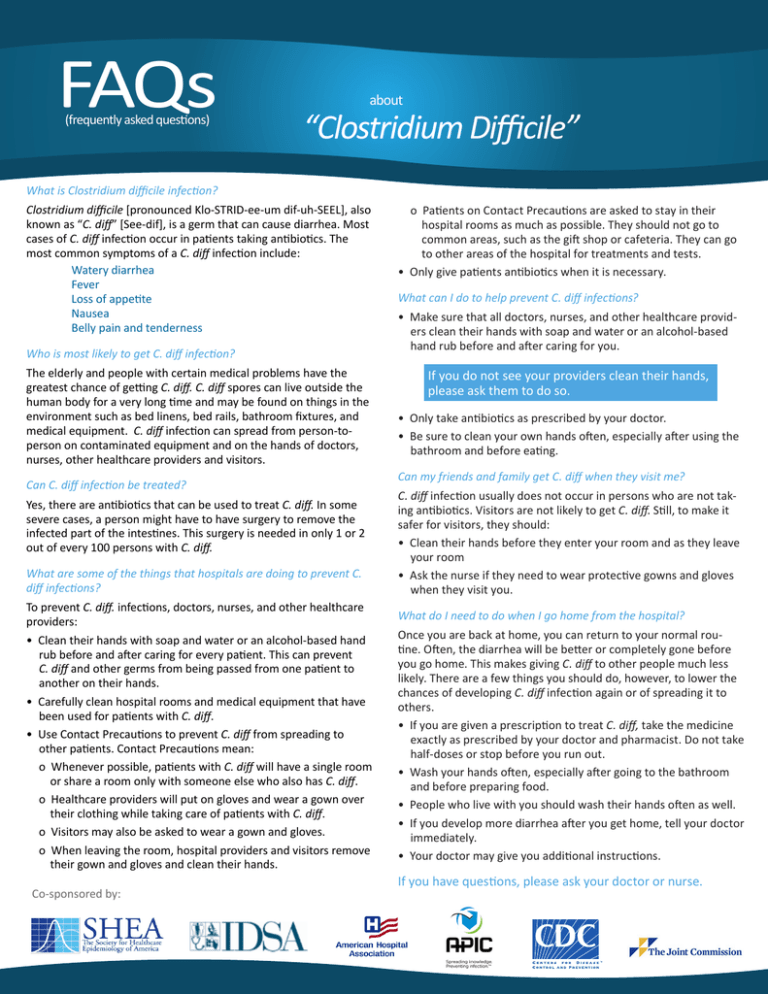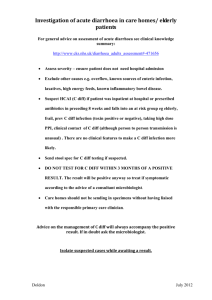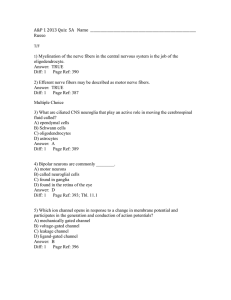Document 13516922
advertisement

FAQs (frequently asked questions) about “Clostridium Difficile” What is Clostridium difficile infection? Clostridium difficile [pronounced Klo-STRID-ee-um dif-uh-SEEL], also known as “C. diff” [See-dif], is a germ that can cause diarrhea. Most cases of C. diff infection occur in patients taking antibiotics. The most common symptoms of a C. diff infection include: Watery diarrhea Fever Loss of appetite Nausea Belly pain and tenderness Who is most likely to get C. diff infection? The elderly and people with certain medical problems have the greatest chance of getting C. diff. C. diff spores can live outside the human body for a very long time and may be found on things in the environment such as bed linens, bed rails, bathroom fixtures, and medical equipment. C. diff infection can spread from person-toperson on contaminated equipment and on the hands of doctors, nurses, other healthcare providers and visitors. Can C. diff infection be treated? Yes, there are antibiotics that can be used to treat C. diff. In some severe cases, a person might have to have surgery to remove the infected part of the intestines. This surgery is needed in only 1 or 2 out of every 100 persons with C. diff. What are some of the things that hospitals are doing to prevent C. diff infections? To prevent C. diff. infections, doctors, nurses, and other healthcare providers: • Clean their hands with soap and water or an alcohol-based hand rub before and after caring for every patient. This can prevent C. diff and other germs from being passed from one patient to another on their hands. • Carefully clean hospital rooms and medical equipment that have been used for patients with C. diff. • Use Contact Precautions to prevent C. diff from spreading to other patients. Contact Precautions mean: o Whenever possible, patients with C. diff will have a single room or share a room only with someone else who also has C. diff. o Healthcare providers will put on gloves and wear a gown over their clothing while taking care of patients with C. diff. o Visitors may also be asked to wear a gown and gloves. o When leaving the room, hospital providers and visitors remove their gown and gloves and clean their hands. Co-sponsored by: o Patients on Contact Precautions are asked to stay in their hospital rooms as much as possible. They should not go to common areas, such as the gift shop or cafeteria. They can go to other areas of the hospital for treatments and tests. • Only give patients antibiotics when it is necessary. What can I do to help prevent C. diff infections? • Make sure that all doctors, nurses, and other healthcare providers clean their hands with soap and water or an alcohol-based hand rub before and after caring for you. If you do not see your providers clean their hands, please ask them to do so. • Only take antibiotics as prescribed by your doctor. • Be sure to clean your own hands often, especially after using the bathroom and before eating. Can my friends and family get C. diff when they visit me? C. diff infection usually does not occur in persons who are not taking antibiotics. Visitors are not likely to get C. diff. Still, to make it safer for visitors, they should: • Clean their hands before they enter your room and as they leave your room • Ask the nurse if they need to wear protective gowns and gloves when they visit you. What do I need to do when I go home from the hospital? Once you are back at home, you can return to your normal routine. Often, the diarrhea will be better or completely gone before you go home. This makes giving C. diff to other people much less likely. There are a few things you should do, however, to lower the chances of developing C. diff infection again or of spreading it to others. • If you are given a prescription to treat C. diff, take the medicine exactly as prescribed by your doctor and pharmacist. Do not take half-doses or stop before you run out. • Wash your hands often, especially after going to the bathroom and before preparing food. • People who live with you should wash their hands often as well. • If you develop more diarrhea after you get home, tell your doctor immediately. • Your doctor may give you additional instructions. If you have questions, please ask your doctor or nurse.







